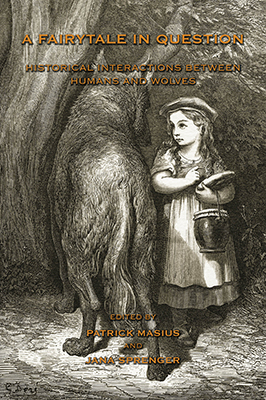A Fairytale in Question
Historical Interactions between Humans and Wolves

Edited by Patrick Masius and Jana Sprenger
A COLLECTION OF ESSAYS PLACING THE HUMAN–WOLF RELATIONSHIP IN HISTORICAL PERSPECTIVE
International in range and chronological in organisation, this volume aims to grasp the maincurrents of thought about interactions with the wolf in modern history. It focuses on perceptions, interactions and dependencies, and includes cultural and social analyses as well as biological aspects. Wolves have been feared and admired, hunted and cared for. At the same historical moment, different cultural and social groups have upheld widely diverging ideas about the wolf. Fundamental dichotomies in modern history, between nature and culture, wilderness and civilisation and danger and security, have been portrayed in terms of wolf–human relationships. The wolf has been part of aesthetic, economic, political, psychological and cultural reasoning albeit it is nowadays mainly addressed as an object of wildlife management. There has been a major shift in perception from dangerous predator to endangered species, but the big bad fairytale wolf remains a cultural icon. This volume roots study of human–wolf relationships coherently within the disciplines of environmental and animal history for the first time.
LOOK INSIDE THIS BOOK at Amazon.co.uk
THE EDITORS
Patrick Masius is a Post-doctoral researcher at Göttingen University, Germany. His research focuses on natural hazards and dangerous animals. In 2010, he received his Ph.D. at Göttingen University with a historical study on politics of natural disasters in the German Empire. Previously, he studied Geography and Social Anthropology at the Universities of Bayreuth and Sussex.
Jana Sprenger Post-doctoral researcher at Göttingen University. She researches the persecution and extirpation of wolves in early modern and modern Germany. In 2011, she received her Ph.D. at Göttingen University with a study about the perception, damage and control of insect pests in forestry and agriculture in Prussian Brandenburg. Previously, she studied Biology, focusing on biodiversity, at Kassel University.
‘The essays making up A Fairytale in Question are an invaluable resource— and a source of disturbing enlightenment—to those studying the effects of fairy tales and folklore on the historical extermination of wolves throughout Europe, North America, and Central Asia.’
Shannon Scott – Marvels and Tales
CONTENTS
Patrick Masius and Jana Sprenger.Introduction.
1. Alexander Kling. Wartime, Wolftime. Material-Semiotic Knots in the Chronicles of the Thirty Years’ War.
2. Martin Rheinheimer. The Belief in Werewolves and the Extermination of Real Wolves in Schleswig-Holstein.
3. Roger Bergström, Karin Dirke, and Kjell Danell. The Wolf War in Sweden during the 18th Century – Strategies, Measures and Leaders.
4. Julien Alleau and John D.C. Linnell. The Story of a Man-eating Beast in Dauphiné, France (1746–1756).
5. Karin Dirke. Where is the Big Bad Wolf? Notes and Narratives on Wolves in Swedish Newspapers during the 18th and 19th Centuries.
6. Patrick Masius and Jana Sprenger. Reconstructing the Extermination of Wolves in Germany. Case Studies from Brandenburg and Rhineland-Palatinat.
7. José María Fernández-García. Historical Decline (and Persistence) of the Grey Wolf in Spain.
8. Steven Rodriguez. British Programmes for the Extermination of the Indian Wolf, c. 1870–1915.
9. Karen Jones. Writing the Wolf: Canine Tales and North American Environmental-Literary Tradition.
10. Linda Kalof. The Shifting Iconography of Wolves over the Twentieth Century.
11. Lydia A. Dixon. Alaska Wild? Wolves in America’s Last Frontier.
12. Robert W. Mysłajek and Sabina Nowak. Not an Easy Road to Success: The History of Exploitation and Restoration of the Wolf Population in Poland after World War Two.
13. Adam Pérou Hermans. ‘If You Wander in Winter, They Will Eat You’: Local Knowledge, Wolves and Justice in Central Asia.
14. Jessica Bell. Hierarchy, Intrusion and the Anthropomorphism of Nature: Hunter and Rancher Discourse on North American Wolves.
Publication date: 15 February 2015, 320pp.
ISBN 978-1-874267-84-3 (HB) £65
ISBN 978-1-874267-92-8 (PB) £28
